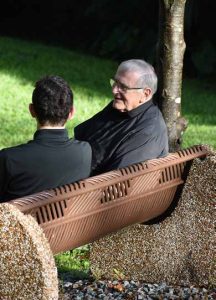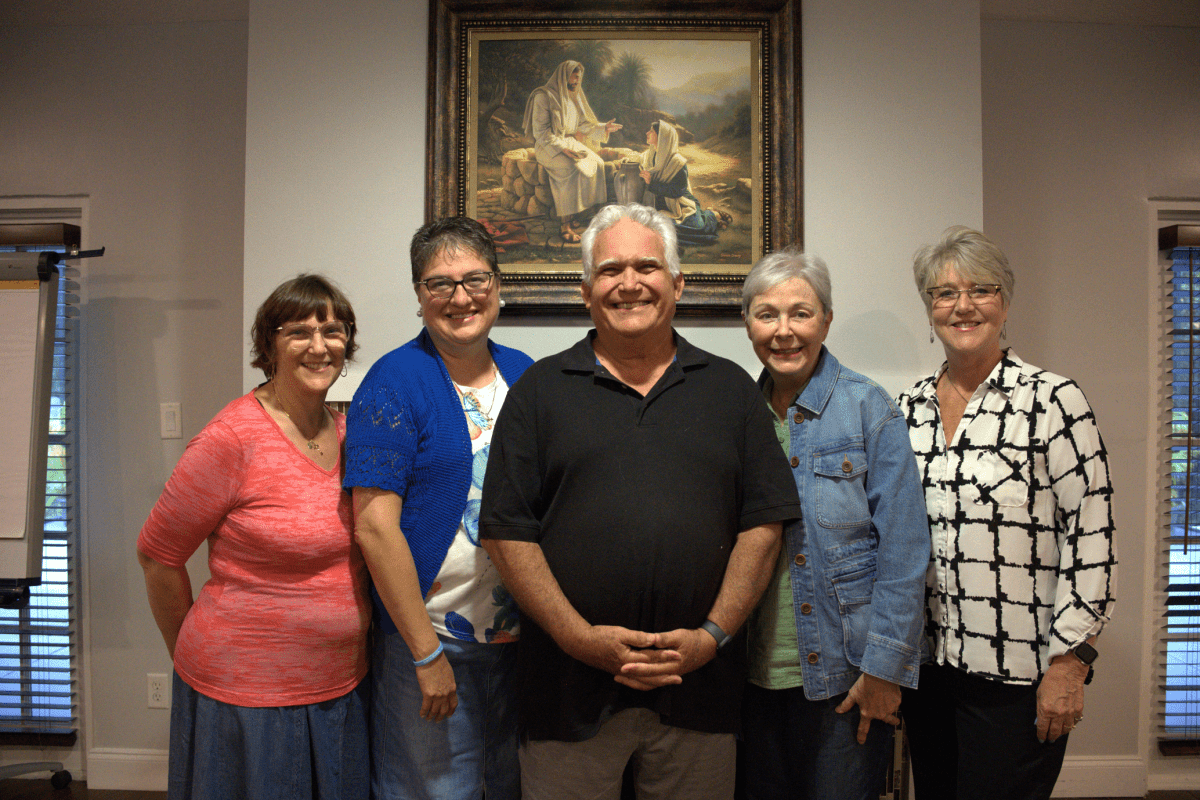Editor’s note: The following is part one of a two-part series
WINTER PARK | Sacred Presence is a new 10-month spiritual direction certification course offered at San Pedro Spiritual Development Center in Winter Park. The first class graduates in July.
The new program, a partnership between the Diocese of Orlando and Mayslake Ministries in Chicago, is a response to the great need for spiritual directors in central Florida.
“It’s been apparent that people are hungry and seeking spiritual direction,” said Katie Phillips, program manager at San Pedro, who helped coordinate the Mayslake partnership. Fielding calls from hundreds of inquirers, she is vetting spiritual directors across the diocese and adding new graduates to the list.
Tasked with the mission to get spiritual direction established, Phillips wanted something “authentic to our faith,” she said. The goal is to train directors and get them matched with seekers as soon as possible.
“Spiritual direction is not what mom and dad would do. It’s a lot deeper. Not a lot of people know how to do it. It’s a process,” said Bishop John Noonan explaining the need for proper training. He spoke of the Ignatian process of direction and others. “It’s just a way and means to help people get closer to God, understanding they can go deeper.”
Bishop Noonan’s desire is to have more spiritual directors available to the laity.
“We’d love for them to discern their life in a spiritual way. You can discern what you want to do in your life, but you can also sense your journey of faith and your relationship with the Lord in the process,” he said.
Isabel Fernandez is the director of Laity, Family, and Life at the diocese. She acknowledged several aspects of spiritual direction training can be challenging — the rigor, cost, investment of required time, and the fact that spiritual direction is not book knowledge.
 “There’s the experiential piece of understanding what you’re getting into,” she said. Applicants are required to participate in direction for at least one year prior to taking the course. “There is an emotional, spiritual cost,” she said which requires an openness and willingness to look at oneself and one’s own relationship with Christ. “A good spiritual director will know when to tell you that you need to go to therapy to resolve other issues prior to partaking in spiritual direction.”
“There’s the experiential piece of understanding what you’re getting into,” she said. Applicants are required to participate in direction for at least one year prior to taking the course. “There is an emotional, spiritual cost,” she said which requires an openness and willingness to look at oneself and one’s own relationship with Christ. “A good spiritual director will know when to tell you that you need to go to therapy to resolve other issues prior to partaking in spiritual direction.”
The two are not the same, she emphasized.
“You’re not fixing anything and you’re not going to be able to. So much of what you’re doing is looking at someone’s prayer life and having them share with you how it is they find God. If you’ve been on this journey yourself, you are more equipped to accompany someone else,” she explained.
She likened the spiritual director to a guide on a pilgrimage. “A guide knows the trail. You’ve walked some of these trails, though not all of them. You yourself are on the trail and working toward a deeper spiritual life; you can help lay out some practices for people – hearing them and reflecting back to them, then come from a place of compassion, of sharing God’s mercy and love with them, of helping them to love what God loves – themselves,” she said. “There’s a beauty in that relationship, but it’s not for the faint of heart.”
Father Anthony Aarons, diocesan director of spiritual development and a spiritual director himself for more than 30 years, describes spiritual direction as a “three-way conversation”. He said, “Spiritual means the person who is directing is the Holy Spirit. It is the willingness to listen to what the Spirit is saying because He has to be speaking to the director and directee.”
He explained spiritual direction is about accompaniment. He makes clear the applicant interested in becoming a spiritual director is not “in it to help.” “Then you have too much an exalted view of yourself,” he explained. Essential in a candidate is, “the willingness to grow because it’s a journey for the spiritual director as well,” said Father Aarons.
Thus, there is a need for openness to other spiritualities such as Franciscan, Jesuit, Benedictine and others, as directors will encounter directees partial to them.
The 10-month course at San Pedro Spiritual Development Center is intensive. The six formation modules cover multiples areas of study from understanding who Jesus is, healthy human and spiritual development, to discernment, living a Christian life, mastery of spiritual direction skills, and more. Each candidate is assigned a mentor who accompanies him or her in training and formation. There is also a rigorous reading list of traditional and contemporary Catholic resources.
Deacon David Baker of Nativity Parish in Longwood said the Sacred Presence course has helped his own spiritual life grow and deepen. He explained, “Jesus is always there and present, but sometimes you don’t always have the frequency tuned right,” and the courses are helping with the fine tuning. “I want me, the directee, and the Holy Spirit to be a unit that comes together to walk with that person,” he said.
“I’d like to be the spiritual director that God wants me to be,” he said. “The spiritual director has to be able to very quickly interpret where that person is, and then what that person really needs. And it’s done through active listening. It’s a matter of the person trusting you.” Speaking to the tremendous need of spiritual directors for his brother deacons, he hopes to serve them as God wills.
Although most clergy are trained to be spiritual directors, it is not a requirement. Someone considering the program may be in parish ministry, already accompanying others.
Sherie Zebrowksi is a real estate professional whose experience runs the gamut from working on Wall Street to owning her own company and raising her two children. In ministry at Epiphany Parish in Port Orange for almost 30 years, she has learned to listen. Discerning this path for five years, she questioned her ability and calling. She said she sees her relationship with directees as “spiritual companions”.
“This ministry is a ministry of accompaniment. One that nurtures strength, structures discovery, and hopefully strengthens one’s relationship with God,” she said. “By offering compassionate listening, the goal is to empower each directee to recognize and embrace the divine at work within their lives.”
Zebrowski describes “sacred listening” as a commitment to non-judgmental guidance, with “a prayerful attentiveness and a supportive presence that encourages individuals to encounter God in a way that is deeply personal and meaningful.” She looks forward to ongoing director meetings and events that will foster her own spirituality and connection with other spiritual directors.
Persuaded to consider the program by her friend Zebrowski, Denise Gillin responded to the call, despite initial uncertainty about her qualifications. Having experienced hardships in her life, including the death of her husband several years ago, she decided to go through the training and let God guide her. “I consider it an honor that somebody would trust me to sit in a room with them, because often they are going to share very personal pieces of their lives,” she said. “I’m not there to give them solutions to their problems. I’m there to listen and ask the questions that will guide them on the path to where they need to be.”
About the program she noted, “I’ve learned that God trusts me enough to trust me with this.”
If you feel God is calling you to become a spiritual director and are interested in the Sacred Presence program or you are a trained spiritual director and would like to be added to the diocesan list, contact Katie Phillips at Katie@sanpedrocenter.org or call 407-671-6322, Ext. 107.
By Glenda Meekins of the Florida Catholic staff, and George Fournier, Special to the Florida Catholic, June 18, 2025

